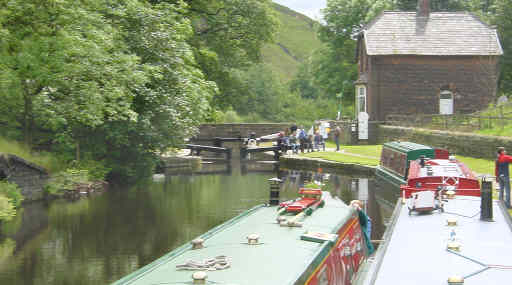As the reaction to this has been building up, British Waterways has hinted that it may be considering doing something similar. A review just announced will look at ways of getting its historic buildings to make "a greater contribution to the cost of maintaining the waterways network". One idea is to transfer property to "specialist associate company part-owned by BW" (to rent out the houses?) while another idea is to sell some of the property top generate money for canal maintenance.

The problem with selling family silver is that once it's gone, it's gone. You can't sell it again. You don't own your heritage any more.
And what will happen once the lock keepers have been moved out and new owners or tenants move in? They may not be canal fans. They may not like the clanking of paddle gear at 6.30 am and demand restricted opening hours. They may not like boats being moored near their pretty cottages.
And what about the waterways staff themselves? Living on site has always had advantages, such as being able to respond quickly to problems.
If BW and EA had properly adequate funding, they would not even need to consider selling their historic property.
You can help the campaign against the sale of Thames lock keepers' houses by asking your MP to sign Early Day Motion 1587.

3 comments:
I hope I can shed some further light onto BW’s review of our residential property estate. First and foremost, I can categorically say that the review is not about selling off the family silver.
If, after the review (and no decisions will be made until next year), any residential properties are sold then all the capital would be reinvested to generate greater long-term income for the upkeep and maintenance of the waterways. In other words, this means potentially finding a new home for a property that generates very little money for canal maintenance and reinvesting the capital elsewhere into something that generates far more annual income.
So whilst the track itself could clearly benefit from increased funds to spend on maintenance, would any such proposals put the heritage or operations of the waterways at risk? Addressing this question is fundamentally part of the review. BW is not going to sell any of its properties to the determent of waterway operations. Similarly, whilst cottages are often integral to the heritage of the waterways themselves, it doesn’t mean that residential cottages aren’t already lovingly looked after and cared for by private owners.
Together with statute (which helps protect listed buildings), when BW has previously sold properties, we have, where appropriate, used either freehold or leasehold covenants to help ensure that the heritage and operations of the waterways are not adversely affected. This would be the case should we sell any properties following the review.
The most telling part of you statement is that you refer to these properties as part of your 'residential property estate'. They may be 'lock keepers cottages' and thus by definition a property in which someone resides, but they aren't a residential item in your estate, they are a place of work for the lock-keeper so he or she can carry out his duties effectively and efficiently. The fact that lock-keepers have lived on the locks from the time the system was built was and is a reflection of the synergistic efficiency that accrues by having the employee live where he works.
The inlands waterways have significantly more traffic now than they ever did in their industrial days, with a reduced skill set for the average boat going through the lock since almost all of us do it for leisure and not for work. So I assume that lock-keepers are at least as necessary in the future for the safety and efficiency of the inland waterways as they are now.
Could you ask the bean counters in BW to publish a full cost-benefit analysis over a 5, 10 and a 20 year period comparing having the lock keeper on-site in his/her cottage with having to do the same job from some off-site location. You should account for indirect factors such as water management, water safety, environmental costs of living on or off site and the impact on the tourist industry of having BW employees rather than private residents facing off to to each other on the lock-side.
Or are these the wrong kind of beans to count?
Brian Rich
NB Otter
It is asset stripping. It has been going on since Maggie Thatcher sold off the mental hospitals and invented 'care in the community'.
The same sort of thing is going on here. Increasingly, waterway users are being asked to look after themselves. Selling off lock cottages is just a prelude to getting rid of lock keepers. One of the few attractions of the job is accommodation on site.
It might be fine for experienced boaters, but of course the licensing authorities also encourage the hire companies by subsidising their licence fees up to a point. Inexperienced boaters definitely need help and advice when using big locks.
An onsite lock keeper, even when off duty, is vital to safety.
If these cottages are sold off, how long before the new occupier starts complaining about passing boats? It won't happen? It has already on the Macclesfield canal. There the new riparian householder's complaint was upheld by the ombudsman due to BW ineptitude. There is now ugly fencing along the towpath by this property to stop mooring.
More than one local borough wants to put fencing around locks in case someone falls in!
Is this how we want to see our Thames locks look in the future? Corralled?
Post a Comment